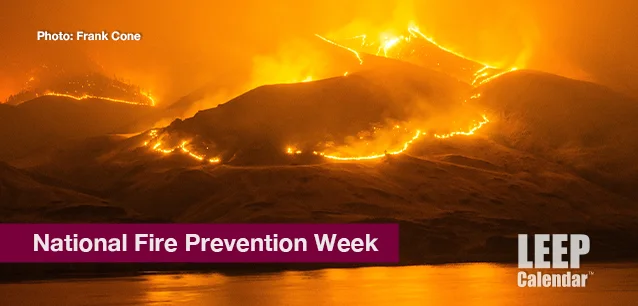 AD
AD
Today is: December 08
Scroll to explore events active on this date.
Additional Events on LEEP
LEEP INK FEATURES

August? Absolutely!
In August, we live through the Dog Days of Summer. It's hot and often humid, and those who can leave for better climates do. Down south, winter is in full force. August is also known as "the ...

In The Heat of July: July 2025 Events
Is it hot enough (or cold enough if you're below the equator) for you yet? There is actually a day for that! Like every month, I pick a diverse collection of events you may or may not know about. This ...

May Blooms: Events in May 2025
Along with October, May is one of the most densely packed months of the year. It's before the summer humidity and the last whole month of the school year. The weather is warming in t...
About National Fire Prevention Week
Environment Space & The Outdoors , Real Estate
United States
Ends: Oct 14, 2023
DESCRIPTION:
National Fire Protection Week encourages people to learn how to prevent and protect against fires. The week marks the anniversary of two killer fires, The Great Chicago Fire and The Peshtigo Fire. Both fires began on the same day in the same year, along with three other major fires in the region.
The Great Chicago Fire of October 8-10, 1871, killed more than 250 people, left 100,000 homeless, destroyed more than 17,400 structures, and burned more than 2,000 acres. October 9 represents the deadliest of the three days.
The most devastating fire in American history remains Wisconsin's Peshtigo Fire, October 8, 1871. The fire only burned for one day but killed 1,200 - 2,400 people and charred over 1.2 million acres. Rain, after months of drought, put it out.
The largest fire in the world included forests in two countries, Russia and China. The 1987 Black Dragon Fire scorched 2.5 million acres and is the deadliest forest fire in history in the People's Republic of China. One hundred ninety-one died by fire, 250 were injured, and 33,000 Chinese became homeless. For context, the second largest fire to date in the US, the 2021 Dixie Fire in California, burned 463,000 acres and killed one; the largest, Alaska's 2004 Taylor Complex Fire, killed 15 and burned 1.3 million acres.
CAUSES OF FIRES
According to the National Park Service (NPS), 85% of wildland fires and 94% of those threatening homes and businesses in the United States begin due to human activity.
These activities include:
Unattended campfires
Burning debris
Equipment use and malfunctions
Discarded cigarettes
Intentional acts of arson
Home fires are caused predominantly by these activities:
Cooking
Portable heaters
Electrical fires from bad wiring
Careless smoking
Unattended candles
Chemicals
Christmas trees
HISTORY OF NATIONAL FIRE PREVENTION WEEK
In 1920, President Woodrow Wilson issued the first National Fire Prevention Day Proclamation, and since 1922, Fire Prevention Week has been observed on Sunday through Saturday, including October 8.
According to the National Archives and Records Administration's Library Information Center, Fire Prevention Week is the record's longest-running public health and safety observance. The President of the United States has signed a proclamation proclaiming a national observance during that week every year since 1925.
VIDEOS
SUPPORTING DOCUMENTS
Currently, this event does not have supporting documents.
ADDITIONAL IMAGES
Currently, this event does not have supporting images.
Where would you like to go now?
 AD
AD


/footer-logo.svg)
